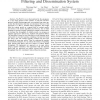Free Online Productivity Tools
i2Speak
i2Symbol
i2OCR
iTex2Img
iWeb2Print
iWeb2Shot
i2Type
iPdf2Split
iPdf2Merge
i2Bopomofo
i2Arabic
i2Style
i2Image
i2PDF
iLatex2Rtf
Sci2ools
101
click to vote
ICDCS
2012
IEEE
2012
IEEE
MOVE: A Large Scale Keyword-Based Content Filtering and Dissemination System
—The Web 2.0 era is characterized by the emergence of a very large amount of live content. A real time and finegrained content filtering approach can precisely keep users upto-date the information that they are interested. The key of the approach is to offer a scalable match algorithm. One might treat the content match as a special kind of content search, and resort to the classic algorithm [5]. However, due to blind flooding, [5] cannot be simply adapted for scalable content match. To increase the throughput of scalable match, we propose an adaptive approach to allocate (i.e, replicate and partition) filters. The allocation is based on our observation on real datasets: most users prefer to use short queries, consisting of around 2-3 terms per query, and web content typically contains tens and even thousands of terms per article. Thus, by reducing the number of processed documents, we can reduce the latency of matching large articles with filters, and have chance to achieve hig...
Adaptive Approach | Datasets | Distributed And Parallel Computing | ICDCS 2012 | Open Source Project |
| Added | 29 Sep 2012 |
| Updated | 29 Sep 2012 |
| Type | Journal |
| Year | 2012 |
| Where | ICDCS |
| Authors | Weixiong Rao, Lei Chen 0002, Pan Hui, Sasu Tarkoma |
Comments (0)

